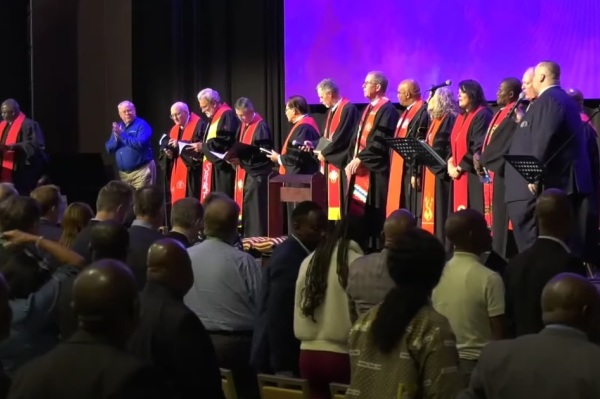Racial Reconciliation and the Gospel: How We Can Exorcize the Ghosts of the Past
It grieves me to witness the extent to which racial mistrust and animosity still besets and bedevils America. However, given the visceral response generated by the tragic events in Ferguson, Missouri and Staten Island, New York, it is clear that we still have a long way to go in our national life before we achieve Dr. King's dream of a nation where people are not judged "by the color of their skin but by the content of their character."

No matter how one might feel personally about the precise nature of these two individual incidents in Missouri and New York City, the undeniable reality is that when black Americans and white Americans view them through such contrasting lenses, we still have a serious rift in the nation's social fabric.
This rift must be healed and healed as quickly as possible because the longer it is left to fester and metastasize, the more alienation and damage is caused, the more difficult it will become to heal, and the more people will be victimized.
If we as a people and a nation are going to achieve true racial reconciliation and justice, it will be the Christian churches that will lead us to Dr. King's "Promised Land." It would seem that the "salt" of the law has done most of the heavy lifting it can do to relieve racial injustice. The salt of the law can change actions, behaviors, and habits. However, it is only the light of the Gospel that can change attitudes, beliefs, and hearts.
Racism is as old as the fallen nature of man. The Bible condemns it from Genesis onward, explaining that Eve was the mother of all (Gen. 3:20). The Apostle Peter reminds us "that God is no respecter of persons." After we have been transformed by being born again from above by trusting in Jesus Christ as our personal Lord and Savior, we live in a new world in which all has been made new.
The Apostle Paul describes that world for us: "For ye are the children of God by faith in Christ Jesus. For as many of you have been baptized into Christ have put on Christ. There is neither Jew nor Greek, there is neither bond nor free, there is neither male nor female; for ye are all one in Christ Jesus" (Gal. 3:26-28).
When we become part of Christ's church of born again believers, our "citizenship is in heaven" (Phil. 3:20, NASB) and we are part of the Kingdom of Heaven, which is "here, but not yet." Each church is to be a present model and positive reminder of the Kingdom of Heaven that will fully arrive upon the Lord's return.
America's problem with race goes back to our beginnings. From our first encounters as Europeans with Native-Americans in Virginia and New England, race has been the serpent in the garden. For all of her greatness, America's treatment of non-whites has been an ongoing tale of prejudice, abuse, and malign neglect.
Unfortunately, the Nobel Laureate William Faulkner was right when he observed, "The past is never dead. It's not even past." There are always the ghosts of the racist past among us, coloring how we perceive the present. Our present is always informed and tinted by our past experiences. Consequently, while most white Americans were dismissive of theories that the police framed O. J. Simpson, many African-Americans, based on their past experiences, found such accusations far too believable.
Once again, in the wake of Ferguson and Staten Island, people default to their past experiences. Like most Anglos, I must confess I have never had a negative experience with a police officer, white, brown, or black. I know few African-Americans, however, who have not had truly bad experiences with the police or know someone well who has.
The only way to truly bridge this divide, heal this rift, and move forward is for Christians, twice-born men and women, to come forward and take the lead in the immediate formation of ethnically diverse coalitions where people can tell each other their stories and begin to exorcise the ghosts of the past together.
Ultimately, we must seek to get out of our comfort zones and strive with intentionality to form truly multi-ethnic, multi-class churches where people of differing ethnicities and socio-economic backgrounds worship together and minister to one another as equal members of the local body of Christ. Then we will hear and know each other's stories, and we will put faces we know on racial and economic injustice. Such churches will truly transform our culture.
The Gospel must begin with the truth that each person must be born again and spiritually transformed by accepting Jesus and His sacrifice on the cross as his Savior. But it doesn't end there. As a consequence or fruit of being born again, we are to go into the world as salt and light (Matt. 5:13-16), seeking to preserve against decay, disinfect against the infection of sin, and dispel gloom and depression with the light of the Gospel.
Being salt and light in society is part of the Great Commission mandate "to observe all things whatsoever I have commanded you" (Matt. 28:19-20).
Back in the 1940s Lillian Smith, a white Southerner, wrote with breathtaking, broken-hearted pathos of her Georgia girlhood experience of racial segregation and how it victimized everyone.
So we learned the dance that cripples the human spirit, step by step by step, we who were
white and we who were colored, day by day, hour by hour, year by year. . . . Something was
wrong with a world that tells you that love is good and people are important and then forces
you to deny love and to humiliate people. . . . in trying to shut the Negro race away from us,
we have shut ourselves away from so many good, creative, honest, deeply human things in
life. . . . what cruelly shapes and cripples the personality of one is as cruelly shaping and
crippling the personality of the other. (Lillian Smith, Killers of the Dream, 1949)
Yes, everyone is victimized when bigotry and racism are perpetrated. But Lillian Smith was wrong when she concluded its victims, white and black, were "stunted and warped" by the experience and "in our lifetime cannot grow straight again."
The Gospel of Jesus reveals to us that we can. We can experience liberation in Christ. We can exorcize the ghosts of the past. We can grow straight again, together in Christ.
Several months after I felt called to full-time Christian ministry at the age of 16, I watched Dr. King's "I Have a Dream" speech on television, August 28, 1963. I was captivated, convicted, and convinced. From that moment forward it was never enough to be opposed to racism and segregation (as I already was). I must confront it, speak out against it, and seek to be a Christian ambassador of reconciliation in my ministry. I have dedicated a significant portion of my ministry in the little over a half-century since that summer day long ago. I remain undaunted. I remain optimistic. I refuse to abandon Dr. King's vision. With Jesus' help we will finish the journey together, black and white, brothers in Christ leading the way.





















